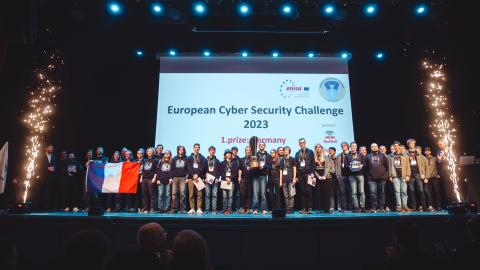Germany is the winner of the 2023 edition of the ECSC, followed by Switzerland in second place and Denmark in third place. The European Union Agency for Cybersecurity (ENISA) thanks the Norwegian University of Science and Technology (NTNU) for hosting the 9th edition in Hamar.
The European Cybersecurity Challenge competition closed on Thursday in Hamar, Norway. A total of 34 teams representing EU Member States and European Free Trade Association (EFTA) countries, as well as the five guest teams of Canada, Georgia, Serbia, Costa Rica, Singapore and the United States of America, took part in this year’s challenge. Latvia participated as an observer.
Juhan Lepassaar, EU Agency for Cybersecurity Executive Director said: " The European Cybersecurity Challenge further expands the networking opportunities, next generations need. We have a duty to help young people find the career they are best suited for to make a significant impact in protecting digital assets and data, and ultimately secure our entire digital life.”
The European Cybersecurity Challenge (ECSC) is an annual exercise, coordinated by the European Union Agency for cybersecurity, ENISA. The ECSC is intended to encourage young people to pursue a career in cybersecurity by challenging participants and developing their skills.
The 2023 edition of the challenge was organised by Norwegian Technical University (NTNU). The awards were presented by Pascal Steichen, Chair of the Governing Board of the European Cybersecurity Competence Centre, and Ambassador Nicolas de La Grandville, Delegation of the European Union to Norway, to the following winning teams:
- 1st place: Germany
- 2nd place: Switzerland
- 3rd place: Denmark
How were the competitors challenged?
The ECSC consists of security-related challenges such as hardware challenges, web and mobile security, crypto puzzles, reverse engineering and forensics.
Technical expertise, though, is not enough to be successful in such a challenge. The participants need to work as a team in a complex environment where decision-making must be both fast and efficient.
The challenge day by day
Days 1 & 3: Teams were faced challenges to be solved in Jeopardy format, testing their capacities in a wide range of skills.
Network and system knowledge are must-have skills in order to succeed. In addition to crypto and steganography, reverse engineering and exploitation know-how are just as essential as web and mobile/wireless security. Hardware hacking scenarios require efficient teamwork and related skills to effectively manage the complexity of the tasks and ensure success.
Day 2:
In the Attack & Defence exercise, the teams need to secure their own networks while, at the same time, hack the networks of the other teams. Compared to the conventional Jeopardy format, teams are faced with significantly more challenges in the Attack & Defence exercise. To be successful, it is important to detect attacks carried out by other teams through analysis of network traffic, log files or other artefacts left behind by the attackers. It is also necessary to eliminate the vulnerabilities in the applications to be protected without impairing their functionality or availability. At the same time, the assets of the other teams must be attacked in order to steal secret data (known as flags).
The role of interpersonal skills
In a challenge involving as many as 34 teams, participants also need to handle excitement and high adrenaline levels. High levels of motivation and engagement are therefore critical to devise a smart approach. The teams that hold the keys to success are those that demonstrate extreme flexibility, responding fast to the evolving scenarios and changing strategies accordingly.
Let’s meet again next year!
The 2024 edition of the European Cybersecurity Challenge will take place in Italy! Stay tuned to the ECSC website.
Further information
ECSC website - European Cybersecurity Challenge
ECSC 2023 dedicated website - ECSC 2023 | European Cybersecurity Challenge
ENISA topic – European Cybersecurity Challenge (ECSC)
ENISA report - Cybersecurity Skills Development in the EU
Contacts:
For questions related to the press and interviews, please contact press(at)enisa.europa.eu

